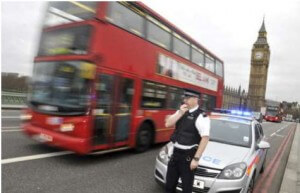Entrenchment of bad technology: the London Metropolitan Police Department
Vernor Vinge, in several of his science fiction novels (such as A Fire upon the Deep), posits the existence of “zones of thought” within the inner portion of our galaxy that place inherent limits on intelligence and technology — the further you get from the galaxy’s center, the greater intelligence and technology is possible. The inner portion of the galaxy is known as the “slow zone”, with the reference both figurative and literal (faster-than-light travel doesn’t work there).
My observations over the decades suggests that IT “slow zones” can develop in organizations — that is, aging, faulty, yet hard-to-displace information technology becomes entrenched, and the organization lacks both the financial and professional resources to successfully replace it. Via the ever-entertaining UK tech site, The Register, I ran across this story about the IT systems used by the Metropolitan Police (i.e., the City of London police department):
The Metropolitan Police are wasting £212m a year maintaining IT gear including a network based on a 1970s-era baggage-handling system, a damning report from the capital’s assembly claims.
A full 85 per cent of the force’s £250m IT budget goes on maintaining “out-of-date, ineffective and overly expensive technology, some of which dates back to the 1970s”, according to the Smart Policing report released today (PDF, 48 pages).
John Biggs, chairman of the assembly’s budget and performance committee and Labour member for the City and East constituency, moaned that “it can take officers up to 30 minutes to log on to a computer”, while pointing out that “having to re-enter the same information in ten different systems wastes time and creates opportunities for error”.
One core system still in use today by the capital’s flatfoots is based on a 1970s baggage-handling system, while the force’s IT infrastructure consisted of more than 750 separate systems which had been bodged together over the last four decades.
Seventy per cent of the force’s systems were labelled “redundant” in the report, with that number expected to increase to 90 per cent by 2015.
It’s worth taking the time to read the whole report (as noted above, a PDF file). The real question is whether the Met Police can get from where they are to where they want be without a systems re-engineering disaster of their own. My colleague Bruce Henderson is fond of saying, “Start out stupid, and work up from there.” However, the usual impulse in such situations is to envision the ideal system with every possible feature, then try to build it while still using (and eventually transitioning over from) the legacy systems. And so we now need to go back to Gall’s Law:
A complex system that works is invariably found to have evolved from a simple system that worked. The inverse proposition also appears to be true: A complex system designed from scratch never works and cannot be made to work. You have to start over, beginning with a working simple system.
It will be interesting to follow how this unfolds over the next few years.





![The Meltdown/Spectre CPU bugs: a dramatic global case of the “Unintended Consequences” pattern [UPDATED 4/4/18] The Meltdown/Spectre CPU bugs: a dramatic global case of the “Unintended Consequences” pattern [UPDATED 4/4/18]](http://bfwa.com/wp-content/uploads/2018/01/intel-cpu-150x150.jpg)